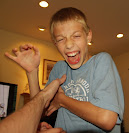Children on the Autism Spectrum and Behavioral Problems at School

"I have a 7 year old son who has yet to be diagnosed but, it is looking as if he has ASD [level 1]. He is having major behavioural problems at school which include hitting other children, staff etc. He is an only child and although there are some behaviour issues at home, the main problem is when he is in a group situation like school. Has anyone else had this experience and if so what did you do?" First of all, you should have him tested by a Child and Adolescent Psychiatrists (ask for a comprehensive psychiatric evaluation) to determine if he, in fact, has ASD (high-functioning autism). There are all sorts of reasons why autistic kids misbehave in school. By the time an autistic student is reacting with violence, it's too late to institute a quick fix. Here are five ways to start dealing with problems or potential problems early, when there is still time to work with teachers and administrators to make school a tolerable place for your youngster. 1. Be r



